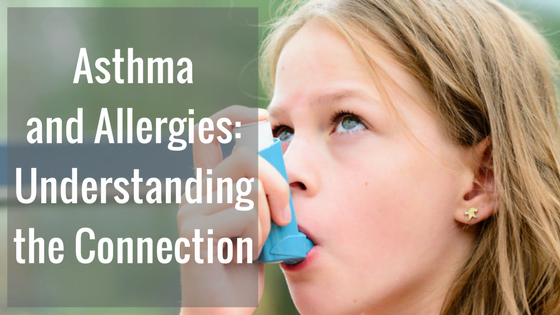Understanding the Connection Between Asthma and Allergies

Asthma is a serious respiratory condition leading to difficulty breathing, coughing and wheezing. Allergies refer to a variety of hypersensitivity disorders causing a range of reactions. While asthma and allergies have two different definitions, they share a strong bond and often occur together.
Substances that trigger allergic reactions such as pollen, pet dander, and dust mites, may also cause asthma symptoms. For some people, food allergies can lead to asthma symptoms. These reactions are often referred to as allergic asthma or allergy-induced asthma.
Living a healthy, full life with allergies and/or asthma is very possible but may involve medical treatments and preventive measures.
Why does an allergic reaction cause asthma symptoms?
Your body creates an allergic response when the proteins of your immune system, called antibodies, identify a harmless substance as a high-risk invader. These antibodies adhere to the allergen as your body’s defense to protect itself. Chemicals released internally lead to itchy eyes, runny nose, nasal congestion, and skin reactions. For some people, these reactions can cause sudden asthma symptoms which affect the lungs and airways, and make it difficult to breath.
Do allergies always cause asthma?
No. While allergic asthma is common, asthma can be caused by several triggers including viral colds, tobacco smoke, stress, exercise, chemicals, solvents, pollution or gastroesophageal reflux (GER). Many people diagnosed with asthma have more than one type of asthma trigger.
Are allergies and asthma treated the same?
In general, allergies and asthma have different treatments. However, a few important treatments help both conditions are are listed below:
Allergen Immunotherapy (allergy shots): Immunotherapy is a powerful treatment for asthma and allergies that normalizes the immune system’s response to allergic triggers. Allergy shots contain tiny amounts of natural allergens and are administered in a regular fashion just below the skin surface. Over that time the therapy helps the immune system develop tolerance to those allergens. Both allergic reactions and asthma symptoms typically decrease during the treatment course.
Anti-Immunoglobulin E (IgE) Therapy: IgE is the type of allergic antibody your body releases when it mistakenly identifies a substance as harmful. Omalizumab (Xolair) helps interfere with your body’s IgE antibodies to prevent allergic reactions and asthma symptoms.
Leukotriene Modifier: Montelukast (Singulair) is a leukotriene modifier in a daily pill to help control immune system chemicals released by your body during an allergic reaction.
How do you keep allergic asthma under control?
Work with your allergist to decide if allergy medications or therapies would help your situation and prevent asthma attacks. You can also take these steps to help control your reactions:
- Avoid triggers. When you know what you’re allergic to, you can take steps to prevent exposure. To keep your home allergen free:
- Keep food in the kitchen to avoid attracting pests throughout the house.
- Wash your bedding in hot water each week.
- Use mattress and pillow covers to guard against dust mites.
- Vacuum daily with a HEPA-filter vacuum.
- To reduce pet dander, limit areas in your home where pets can be such as the bedroom.
- Partner with your allergy specialist. Your allergist may recommend short-term or long-term medications for current relief and to get your asthma under control.
- Be prepared. You may be prescribed medications for allergies to reduce asthma triggers, but you should also carry a rescue inhaler in the event you’re exposed to unexpected allergies. Speak with your allergist to determine what’s best for you based on your triggers.
At the Allergy & Asthma Specialists of North Florida, we specialize in helping our patients identify allergy triggers and develop a treatment plan to decrease and eliminate allergic asthma reactions. Contact us to schedule an appointment and improve your quality of life by putting your allergies and asthma in the past.
